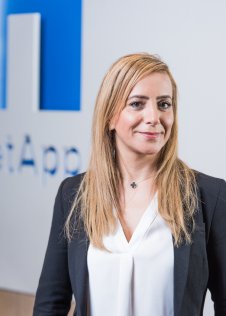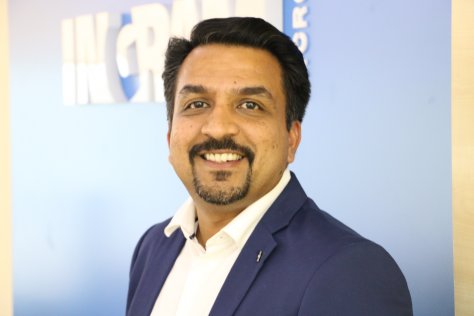CNME Editor Mark Forker managed to secure an exclusive interview with Maya Zakhour, Channel Director, Middle East, Africa, Italy and Spain at NetApp, and Sam Johny, Business Unit Manager at Ingram Micro, to discuss the nuances involved with digital transformation and the growing demand for hybrid cloud and data services.

COVID-19 has disrupted and fundamentally reshaped how we work, when we work, where we work and everything else in between. However, one direct consequence of the global pandemic has been the exponential growth and acceleration in digital transformation across the Middle East.
Enterprises quickly recognised that they needed to adopt and integrate new technologies in order to keep the show on the road.
However, digital transformation, despite its huge benefits, isn’t without complexity, but the biggest problem appears to be when it comes to strategy, and as Maya Zakhour points out there isn’t a one size fits all solution when it comes to digital transformation.
“I think it has become very evident that many businesses have taken the wrong approach when it comes to digital transformation. Digital transformation is going to look differently for every company, and there is no one approach that works universally. At NetApp, we characterise digital transformation (DX) as a strategy of enabling business innovation based on the incorporation of digital technologies into operational process, products, solutions, and customer interactions. This strategy is focused on leveraging the opportunities of new technologies and their impact to the business by focusing on the creation and monetisation of digital assets,” said Zakhour.
The dynamic Channel Director at NetApp added that digital transformation also represents huge cultural change as it requires the organisation to really challenge their current status quo.
“The current pandemic has forced businesses to think more about digital transformation than they did before and is why approaches differ from one enterprise to another, but what really matters today is data. A business that doesn’t have data at the core of its decision-making process will not survive in this on-demand data driven economy,” said Zakhour.
Sam Johny echoed the sentiments expressed by Zakhour and added that one of the biggest issues within the IT ecosystem was the misconception as to what is digitalisation and what is digital transformation.
“People generally use the terms digitalisation and digital transformation, but they are both very different terminologies and have two very different meanings. In my opinion, digital transformation is predominantly about how the people, the process and the technology within an organisation needs to be changed. The moment the three of these components are combined then that’s digital transformation. However, some people have mischaracterised small software updates and labelled it digital transformation, but that isn’t digital transformation, that is digitalisation,” said Johny.
Johny also pointed to a recent study that was conducted by Gartner that projected there will be 25 billion connected things by 2025 – and claimed that businesses had no other choice but to embrace change.
“These trends are why all organisations need to embrace digital transformation, but if they want to be successful then they need a mindset to change, but that’s an easy term to say, but applying this within an organisation is a huge challenge. Collaboration and data are key in order to ensure that your digital transformation is a success. Data-driven action plans need to be defined in a digital transformation journey. In my opinion, digital transformation is an absolute must for businesses as everything in the future is going to be connected,” said Johny.

Data is growing exponentially as we become more connected and the traditional methods of storing data is now archaic. In the Middle East, we’ve seen a huge move towards cloud and businesses need to be more agile to deliver better customer experiences and outcomes, but as Maya and Sam illustrate digital transformation is not easy.
According to Zakhour, NetApp is committed to helping their customers achieve digital transformation but conceded that transitioning to the cloud is not without its challenges.
“Enterprises are looking for any edge they can find to compete in today’s digital world. They want help and need a new approach to remain relevant, but digital transformation is difficult. Cloud is the future and the conversations in the IT ecosystem are around whether to adopt a hybrid cloud, multi-cloud, public cloud, or private cloud model to manage their applications and data. Traditionally, we stored all our data in one place, but that model is now obsolete because of the connected nature of today’s data-driven economy. This is a challenge as all businesses want is simplicity. We try to help our customers transition to digital transformation in a simple way – but migrating to the cloud is causing a lot of complexity,” said Zakhour.
She added that there are three fundamental questions that every NetApp partner needs to ask their customers if they are to help them successfully execute their digital transformation objectives.
“At NetApp we remove the complexity for our customers by leveraging our technology and expertise to deliver their digital transformation. But to do this we follow a direct set of questions. There are three questions I’d like every NetApp partner to ask their customers and that is, ‘What does your hybrid or multi-cloud strategy look like? How can we simplify your transformation? How are you utilising your data? Once you establish the answer to all three of these questions then you can help deliver digital transformation for your customers in a much more, effective, efficient and faster way,” said Zakhour.
According to Johny one of the key components of digital transformation is keeping up with the pace of change, as there are so many innovative changes occurring at a rapid pace.
“Organisations need to possess the ability to adapt to change in order to remain competitive. Now, that is something that is easy to say, but difficult to implement. There is a great resilience from IT departments to drive more value to their business, because IT has now become an integral part of organisations. Digital transformation is predominantly about changing the behaviors of the IT department, but it does make it more complex when they have diversification. When you talk about advanced technologies like Cloud, Big Data, IoT, AI and mobility it all leads to IT complexity. Most enterprises don’t have a strong IT network to develop their digital transformation and that is a big challenge,” said Johny.
NetApp has firmly established itself as a leading global player in hybrid cloud services, and the Business Unit Manager at Ingram Micro said it is a huge opportunity for NetApp and their partners to promote the success of its hybrid cloud product.
“We have a longstanding relationship with NetApp and worked together successfully in tandem for years. We have a huge install base of customers where we can educate and help them to transform their digital journey through a hybrid cloud model. NetApp has a fantastic hybrid cloud product that allows customers to have an independent scaling of compute and storage, the ability to adapt to workloads, whilst also guaranteeing phenomenal performance,” said Johny.
Zakhour illustrated how the absence of an obvious cloud strategy for enterprises to adopt and implement has caused confusion in the IT industry, but that in turn has led to a surge in demand for hybrid cloud services.
“It is very evident in the current climate that there is no multi-cloud roadmap that enterprises can follow to reach their transformation goals. Customers are asking questions like, ‘Do I put all my data and workloads on the cloud? My applications come in different forms, should I put some on-prem and a few on the cloud? In the past it was easier because everybody stored their data in one location. Some applications need to access data from multiple clouds, so that is why we’re starting to see this demand for a hybrid cloud model,” said Zakhour.
Zakhour added that many organisations are still struggling to find the ultimate strategy that works for them – but stressed that its NetApp Data Fabric is helping their customers and partners to develop the right strategy.
“Your cloud strategy at the end of the day is all about how you manage your data. Cloud is an unstoppable force and it enables innovation that drives scale, speed and execution. But sometimes you need to do cloud your own way, regardless if it is public, Microsoft Azure, or AWS, you want to do cloud your own way by leveraging the resources that are perfect for your business, and this is what differentiates NetApp from the rest and is why we’ve become the go-to’ partner for hybrid cloud,” said Zakhour.





